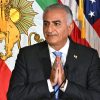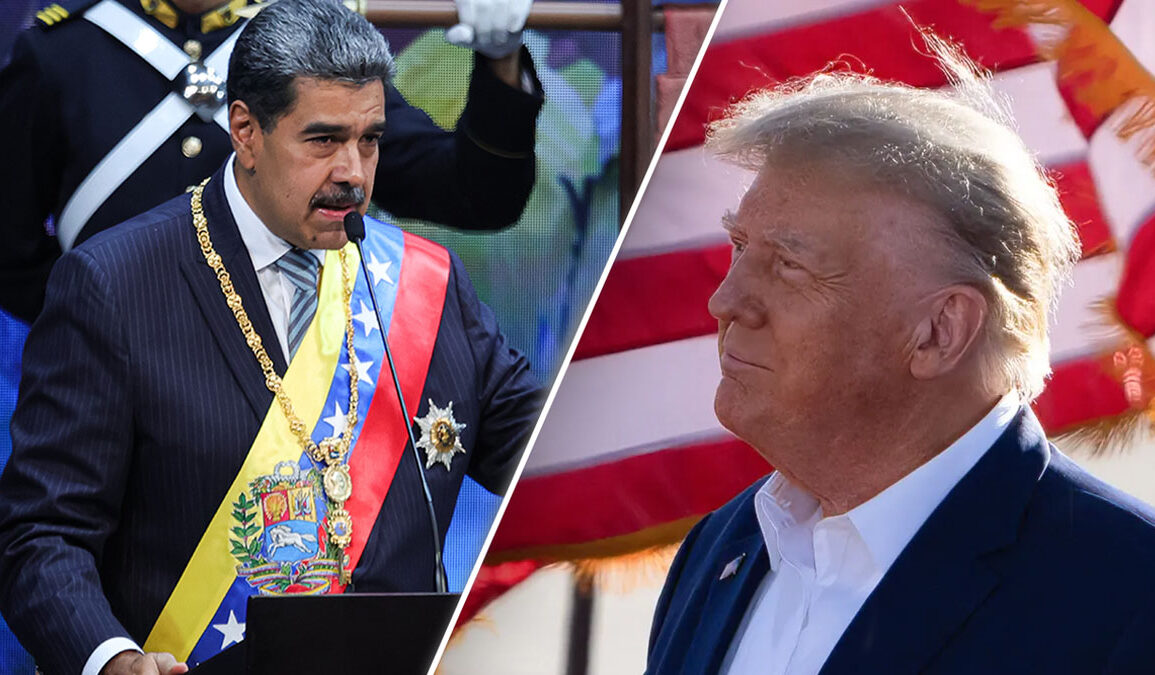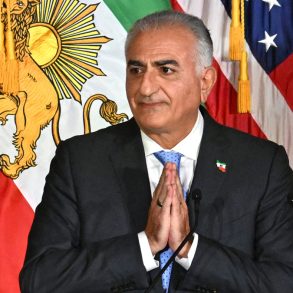President Donald Trump has moved closer than ever to direct action against Venezuela, combining military strength, diplomatic signals, and a public focus on drug trafficking that masks a deeper reality. While Trump frames the current mobilization as an operation to stop narcotics networks, supporters argue that he also knows Venezuela’s elections were rigged, that Nicolás Maduro should not be president, and that most Venezuelans want him gone.
At the center of the story is the USS Gerald R. Ford, the world’s largest aircraft carrier, now positioned just off Venezuela’s northern coast. Its arrival, along with tens of thousands of U.S. forces and advanced strike capabilities, has set the stage for what opposition leader María Corina Machado called an imminent strike. The Nobel Peace Prize winner said all indicators show the country is reaching a final phase in ending Maduro’s rule, and she credited Trump for driving the pressure campaign to this point.
The Gerald Ford and the Expanding U.S. Military Presence
The USS Gerald R. Ford’s movement into the Caribbean marks one of the most significant U.S. deployments in the region in years. The carrier brings more than 4,000 sailors, advanced strike fighters, guided missile destroyers armed with Tomahawks, an amphibious assault ship for rapid insertion, and Air Force surveillance aircraft already operating from regional bases. In total, U.S. forces in the area number around 15,000.
Officials publicly claim the buildup is part of a counter narcotics mission. Pentagon planners say the posture is meant to interdict drug trafficking, but privately admit the forces can shift to offensive operations at any moment. Defense Secretary Pete Hegseth described the effort as Operation Southern Spear, saying it aims to defend the homeland, remove narco terrorists from the hemisphere, and protect the region from drugs that are killing Americans.
This buildup was reinforced by a series of U.S. strikes on boats accused of carrying narcotics. The United States has struck at least 21 vessels in the Caribbean and eastern Pacific. Officials say these boats were carrying drugs along known smuggling routes. More than 75 people have been killed. Some lawmakers argue the administration has not provided sufficient evidence to justify the deadly force, though the Senate twice rejected efforts to require congressional approval.
Drug Trafficking and the Cartel de los Soles
A major part of Trump’s argument is that Venezuela’s leadership is tied directly to narcotics networks. Washington plans to designate the Cartel de los Soles as a foreign terrorist organization. U.S. officials allege the cartel is led by Maduro and members of his inner circle. Secretary of State Marco Rubio said the cartel has corrupted Venezuela’s military, intelligence services, legislature, and judiciary. This designation would allow the United States to seize assets, restrict financial flows, and treat cartel affiliates as terrorists.
Maduro denies involvement and accuses the United States of inventing a conflict to undermine his government. Critics argue that the drug network designation is being used as a legal and political path toward regime change. Supporters claim the designation is appropriate, since the Maduro regime has used criminal networks to enrich itself while Venezuelans flee the country in the thousands.
Trump Opens the Door to Talks, but Keeps Pressure High
Despite the military buildup, Trump says he may speak with Maduro. He told reporters both in West Palm Beach and aboard Air Force One that Maduro’s government wants to talk. His comments suggested a temporary pause, though officials say the attack window could open within 48 hours if diplomacy fails.
Former Veterans Affairs Secretary Robert Wilkie summarized the situation bluntly. He said Maduro must come to the table or face a strike that would decapitate the apparatus used to terrorize Venezuelans. Wilkie emphasized that Trump does not want ground forces involved but is prepared for a high precision attack to destroy Maduro’s security machine. He also pointed to the foreign elements supporting Maduro, including Cuban operatives, Iranian advisers, and Russian security services.
Trump himself said he has “sort of made up his mind” about how he will proceed. He hinted at progress in stopping drugs from entering the United States but did not reveal whether he has chosen military action.
Planning for a Post Maduro Venezuela
A detailed Politico report reveals that Trump administration officials are far along in discussions about what happens if Maduro falls. These plans include possible exile destinations for Maduro, the option of capturing him and putting him on trial in the U.S. on narcotics terrorism charges, and determining which sanctions should be lifted and when. Discussions also include rebuilding Venezuela’s shattered economy with assistance from the World Bank and IMF, using private security firms to protect new leaders, and integrating the opposition, especially Machado’s team, into a post conflict government.
The speed and detail of this planning suggest the White House views Maduro’s exit as increasingly likely.
Supporters, Skeptics, and Critics Weigh In
Supporters of a U.S. strike say Venezuela’s suffering has gone on long enough. They argue the nation was once one of the richest in the region and has been ruined by corruption, mismanagement, and criminal activity (now on par with North Korea). They see Trump’s actions as decisive steps toward freeing millions from an illegitimate ruler who clings to power through force and foreign assistance.
Skeptics worry about the consequences of military action. They point to the deaths from the boat strikes and question whether all targets have been legitimate. Some lawmakers say Trump is bypassing Congress and risking a larger regional conflict. They argue that without clear evidence tying each vessel to narcotics networks, the strikes risk killing innocent people and damaging U.S. credibility.
Trump opponents go further, saying the administration is using drug trafficking as a cover for regime change. They accuse Trump of escalating tensions without a clear plan for what comes next and of setting the United States on a path toward war. They claim the designation of the Cartel de los Soles and the placement of the Gerald Ford near Venezuela are designed to provoke Maduro into a reaction that can justify military action.
While the drug trafficking explanation remains the official line, many believe the deeper motivation is political. Critics of Maduro argue that Venezuela’s elections were rigged, that opposition leaders were jailed or barred from participation, and that millions of Venezuelans want Maduro gone. Trump’s supporters say the president understands this and is willing to use pressure from narcotics operations to bring about an outcome Venezuelans have been seeking for years.
For now, the region waits for Trump’s final decision. Whether the standoff ends through negotiation or military action, Venezuelans and U.S. officials agree that the next few days could determine the country’s future. As one senior opposition figure said, the moment is here.








